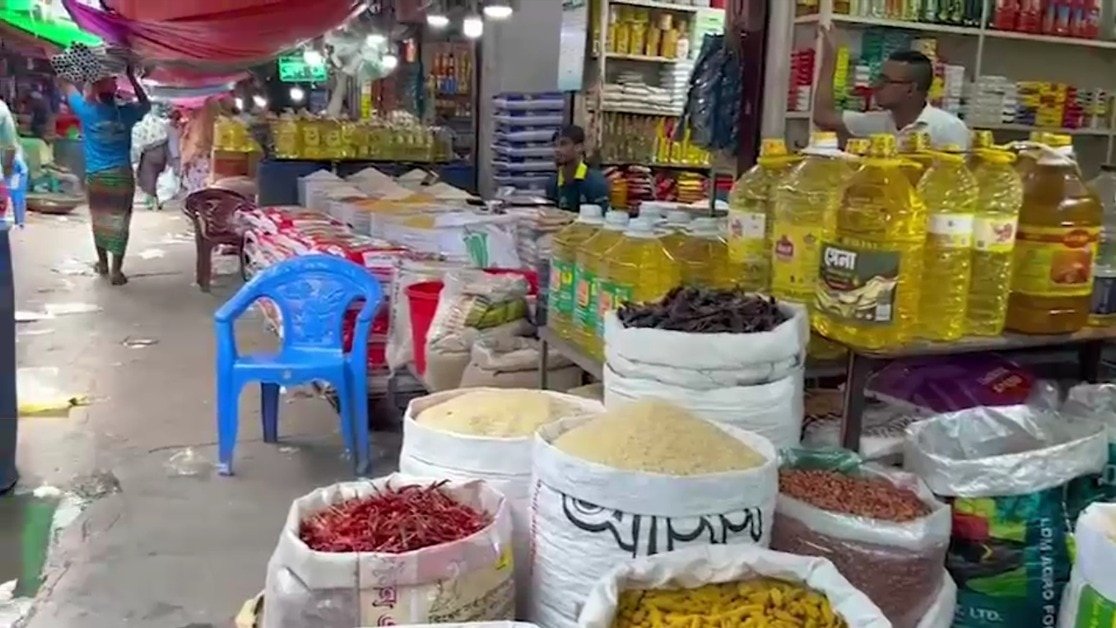Bangladesh, which remains on the brink of instability, is facing a severe economic crisis. According to data from the Bangladesh Bureau of Statistics, the consumer price index (inflation) hit a 12-year high of 11.66 percent in July. Food inflation, in particular, exceeded 14 percent in July for the first time in 13 years, The Daily Star reported.
Due to the protests, the supply chain was severely affected across Bangladesh. Moreover, the country’s business sector is also facing a liquidity crisis as the central bank has imposed restrictions on the maximum amount of cash withdrawals in the face of uncertainty following the Overthrow of the government led by Sheikh Hasina, and the new administration of Nobel Peace Prize winner Muhammad Yunus, which is working to restore normality to the country.
Bangladeshi citizens cannot withdraw more than 2 lakh Bangladeshi Taka at a time from a bank.
India Today visited Kawran Bazaar, the Dhaka’s largest wholesale market, to speak to some of the local retailers and find out their situation. In a context where the value of the Bangladeshi taka has been steadily falling against the US dollar, retailers are under pressure to keep prices of essential commodities stable, which is not allowing them to make good profits.
However, retailers told India Today that prices would soon go up.
The number of people coming to Kawran Bazar has significantly reduced due to the unrest in the country. Although there has been peace in Dhaka for the past few days, protests continue in the interior of Bangladesh.
Shafiqur, a local retailer, told India Today that prices of essential commodities like rice and pulses, among others, have “marginally gone up” as they are imported.
“We are not raising prices despite disruptions in the supply chain mechanism,” he said.
Another retailer, Rafiq, echoed Shafiqur, saying that for now traders are keeping prices stable but the government has assured them that they will be able to increase prices next month, considering that essential products are already becoming expensive.
Bangladesh imports pulses, nuts, spices and other essential commodities from neighbouring countries including India.
Prices of commodities and other items are expected to rise further due to supply chain disruptions.
Meanwhile, data from the Central Bank showed that Bangladesh’s foreign exchange reserves reached $20.48 billion on July 31, down from $21.78 billion in the previous month. A decline of nearly $1.3 billion in Bangladesh’s foreign exchange reserves has forced the interim government headed by Muhammad Yunus to take important decisions, including limiting the maximum cash withdrawal in a day.
Local trader Islam Mohammad told India Today that the maximum withdrawal limit is preventing them from buying more foreign currency, causing the entire trading business to slow down.
They said the inability of the business community to purchase foreign exchange in good quantities, which is necessary for trade, will eventually affect imports and fuel inflation in Bangladesh.
Bangladesh is in the grip of unrest that began as a protest against the quota system for government jobs but soon escalated into anti-government demonstrations that left at least 400 people dead. The unrest led to the resignation of Sheikh Hasina as prime minister and Muhammad Yunus – known as the “banker of the poor” – taking over as senior adviser to the interim government.
The protests have caused an exodus of minorities, especially Hindus, from Bangladesh as they have attacked by mobs, Social media is abuzz with reports of vandalism, looting and lynchings. Muhammad Yunus and other Bangladeshi political leaders have repeatedly called for peace and calm, and the country’s new leader has urged students at the centre of the protests to protect minorities.
Tune in
#Field #Report #Bangladesh #faces #severe #economic #crisis #unrest #hits #businesses
